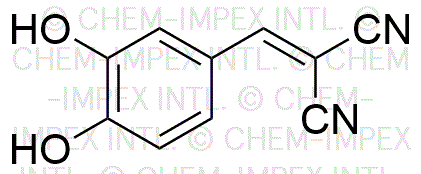Tyrphostin A23 is widely utilized in research focused on:
- Cancer Research: This compound acts as a potent inhibitor of specific receptor tyrosine kinases, making it valuable in studying cancer cell signaling pathways and developing targeted therapies.
- Neuroscience: Tyrphostin A23 is used to investigate the role of growth factors in neuronal survival and differentiation, aiding in the understanding of neurodegenerative diseases.
- Pharmaceutical Development: Its ability to modulate cellular responses makes it a candidate for drug formulation, particularly in creating therapies for conditions linked to abnormal cell growth.
- Biochemical Assays: Researchers employ this compound in various assays to evaluate the effects of tyrosine kinase inhibition on cellular processes, providing insights into drug mechanisms.
- Signal Transduction Studies: By inhibiting specific kinases, it helps elucidate the signaling pathways involved in cellular communication, which is crucial for developing new therapeutic strategies.
Informations générales
Propriétés
Sécurité et réglementation
Applications
Tyrphostin A23 is widely utilized in research focused on:
- Cancer Research: This compound acts as a potent inhibitor of specific receptor tyrosine kinases, making it valuable in studying cancer cell signaling pathways and developing targeted therapies.
- Neuroscience: Tyrphostin A23 is used to investigate the role of growth factors in neuronal survival and differentiation, aiding in the understanding of neurodegenerative diseases.
- Pharmaceutical Development: Its ability to modulate cellular responses makes it a candidate for drug formulation, particularly in creating therapies for conditions linked to abnormal cell growth.
- Biochemical Assays: Researchers employ this compound in various assays to evaluate the effects of tyrosine kinase inhibition on cellular processes, providing insights into drug mechanisms.
- Signal Transduction Studies: By inhibiting specific kinases, it helps elucidate the signaling pathways involved in cellular communication, which is crucial for developing new therapeutic strategies.
Documents
Fiches de données de sécurité (FDS)
La FDS fournit des informations de sécurité complètes sur la manipulation, le stockage et l’élimination du produit.
Spécifications du produit (PS)
Le PS fournit une description complète des propriétés du produit, notamment sa composition chimique, son état physique, sa pureté et les exigences de stockage. Il détaille également les plages de qualité acceptables et les applications prévues du produit.
Certificats d'analyse (COA)
Recherchez des certificats d'analyse (COA) en saisissant le numéro de lot du produit. Les numéros de lot et de lot se trouvent sur l'étiquette d'un produit, après les mots « Lot » ou « Lot de fabrication ».
Numéro de catalogue
Numéro de lot/série
Certificats d'origine (COO)
Ce certificat d'exploitation confirme le pays dans lequel le produit a été fabriqué, et détaille également les matériaux et composants utilisés et s'il est issu de sources naturelles, synthétiques ou autres sources spécifiques. Ce certificat peut être requis pour les douanes, le commerce et la conformité réglementaire.
Numéro de catalogue
Numéro de lot/série
Fiches de données de sécurité (FDS)
La FDS fournit des informations de sécurité complètes sur la manipulation, le stockage et l’élimination du produit.
DownloadSpécifications du produit (PS)
Le PS fournit une description complète des propriétés du produit, notamment sa composition chimique, son état physique, sa pureté et les exigences de stockage. Il détaille également les plages de qualité acceptables et les applications prévues du produit.
DownloadCertificats d'analyse (COA)
Recherchez des certificats d'analyse (COA) en saisissant le numéro de lot du produit. Les numéros de lot et de lot se trouvent sur l'étiquette d'un produit, après les mots « Lot » ou « Lot de fabrication ».
Numéro de catalogue
Numéro de lot/série
Certificats d'origine (COO)
Ce certificat d'exploitation confirme le pays dans lequel le produit a été fabriqué, et détaille également les matériaux et composants utilisés et s'il est issu de sources naturelles, synthétiques ou autres sources spécifiques. Ce certificat peut être requis pour les douanes, le commerce et la conformité réglementaire.

